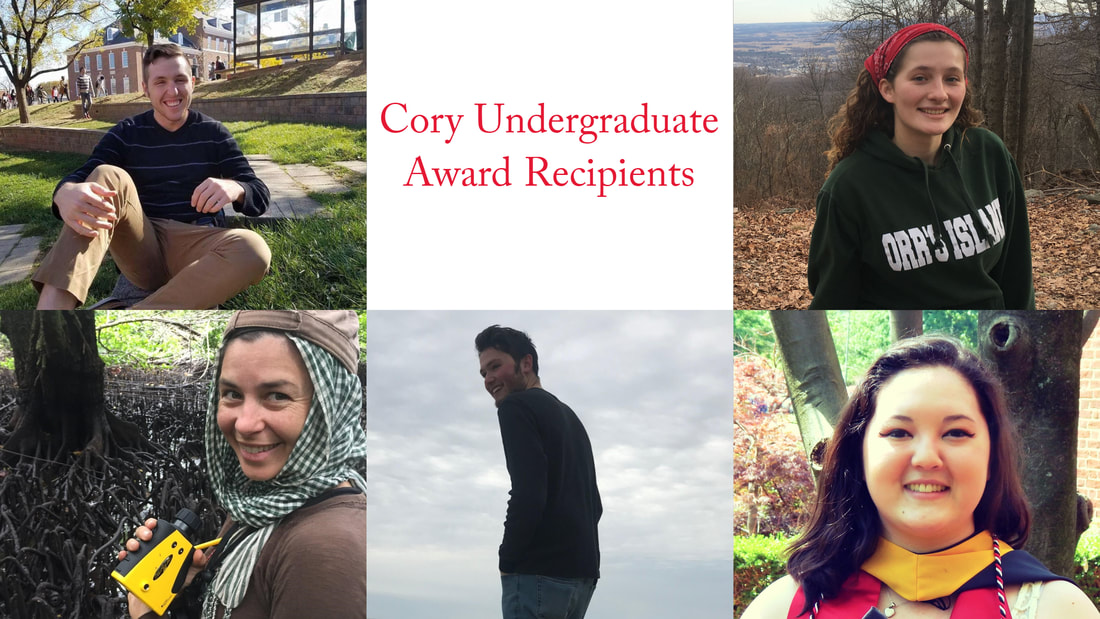|
Congratulations to the recipients of the Fall 2018 Ernest N. Cory Undergraduate Scholarship! This scholarship provides up to $1,000 for undergraduate students each semester who have creatively contributed to Entomology Department research and/or extension efforts. Choose, "Read More" to find out about Kevin Clements, Julianna Greenbreg, Kristin Jayd, Max O’Grady and Katherine Okada and their extraordinary efforts in Entomology! Kevin Clements has been volunteering in Dr. Lamp’s lab since the Fall of 2017. As an ecology and evolution major, and someone who spends a lot of time outdoors, this Lab was a natural fit. Kevin has been collecting isopods from Delmarva Bay streams and wetlands in order to identify the species of isopods, and compare them amongst individuals from associated streams or wetlands. Kevin’s time in this lab helped reinforce his desire to continue research after graduating, and he plans to pursue a master’s degree in the field of ecology.
Julianna Greenberg is a rising senior pursuing a bachelor’s degree in Biological Sciences with a concentration in Ecology and Evolution and a minor in Sustainability. This past year, she conducted independent field research in the Palmer lab characterizing the plant communities of wetlands in the Delmarva Peninsula. She focused on comparing the plant communities of wetlands that were restored from agricultural land use and natural wetlands in the area. As the vegetation of a wetland can influence the amount of methane that is released from the soil, characterization of these plant communities allowed her to ask questions regarding the methane produced by agricultural and natural wetlands. After graduation, Julianna plans to continue her education and pursue a masters and subsequent PhD in Ecology or a related field. Kristin Jayd is a first-generation degree seeking student majoring in Environmental Science and Policy, with a concentration in Wildlife Ecology. (She’s also mom to a 16 year old son and 13 year old daughter.) Kristin is happiest looking for arthropods in hot, humid field sites, or behind a microscope for hours at a time. Her academic interests include entomology, ecology, and higher education. She is weaving these together with the goal of teaching natural sciences in a community college setting and providing laboratory and field research opportunities to non-traditional students like herself. Max O’Grady Max is a senior at the University of Maryland, currently working and conducting research in the Department of Entomology under Dr. Dennis vanEngelsdorp on honey bee health and diseases. He is working on a major in environmental science and policy with a concentration in environment and agriculture. Max has been working at the vanEngelsdorp lab since he started at UMD in September 2015, and he has plans to do so for the rest of his undergraduate career. In addition to working in the lab, Max is pursuing an honors certificate from the Department of Entomology for conducting extensive undergraduate research on factors that affect wax production. Max says, “Through my work at the University of Maryland, I have gained excellent knowledge and experience in beekeeping and research skills.” Max has enjoyed being a part of the University of Maryland Department of Entomology, and he looks forward to his continued work here. Katherine Okada Despite being a nature lover ever since she was a child, Katherine never thought she would be working with insects until she took two courses on entomology and freshwater biology during her undergraduate education. Now, she has discovered a passion for these tiny creatures and has been assisting graduate members of the Lamp Lab with a variety of projects. When she first joined, she helped to sort through samples in leaf packs to examine the effects of Bt corn leaves on freshwater stream macroinvertebrates and assisted graduate student Brock Couch in processing macroinvertebrates to investigate the connectivity between Eastern Shore streams and wetlands. She also curated insects from agricultural ditch samples to help graduate student Dylan Kutz catalog the beneficial species diversity of these ditches. Katherine will also be continuing work on her own project this summer under the supervision of PhD candidate Rebecca Wilson-Ounekeo. Her project involves investigating the connection between the preferred food of the larvae of the black fly species S. jenningsi and S. luggeri and the preferred oviposition locations for the adult females. By analyzing the particulate gut content of the larvae, she hopes that the data collected will improve the ability of pest management groups to predict the locations where the adult flies will emerge. Comments are closed.
|
Categories
All
Archives
June 2024
|
Department of Entomology
University of Maryland
4112 Plant Sciences Building
College Park, MD 20742-4454
USA
Telephone: 301.405.3911
Fax: 301.314.9290
University of Maryland
4112 Plant Sciences Building
College Park, MD 20742-4454
USA
Telephone: 301.405.3911
Fax: 301.314.9290


 RSS Feed
RSS Feed




